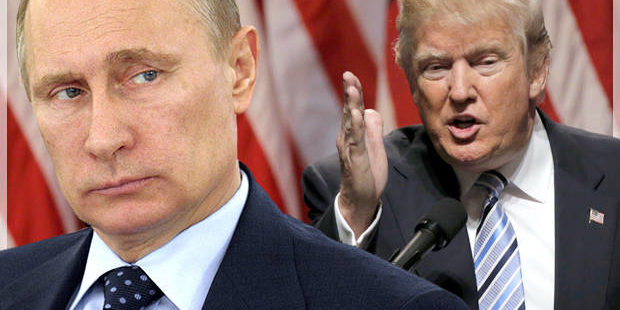
War in the media age: Hysteria over Trump’s supposed Russian ties made headlines, but the “story” is remarkably flimsy
A case study in how a co-opted press manufactures foreign policy consent
From one week to the next, I note with mounting anxiety the media’s habit of using innuendo, loaded suggestion, assemblages of proximate facts, implication short of assertion and omission to avoid factual news reports. We, the reading and viewing public, are invited to draw conclusions about major events with ever-increasing degrees of uncertainty. Forget enlightenment. We grow endarkened.
Just as alarming are the numbers of us who are perfectly willing to take part in this pervasive ruse. Shrill conviction follows, and a dangerous undertow of fear, animus and belligerence follows.
There is nothing new in this. Americans have been easy marks for those practiced in the manipulation of crowds at least since newspaper magnate William Randolph Hearst provided Theodore Roosevelt, then secretary of the Navy, with the righteous frenzy he needed to start the Spanish-American War. But things are far graver now. There is incalculably more at risk. This nation faces large, consequential decisions but insists on rendering itself ever less capable of making them.
That is what it comes to. Consider the distance, in numerous recent events, between what occurred, what we know, what we are told we know (less in each case) and what we are then duped into assuming. It is large. And it is consequential.
Three weeks ago we had the hacking of the Democratic National Committee’s electronic mail: The Russians did it. Last week we were warned that Russia is amassing troops and matériel in Crimea in response to a Ukrainian incursion: What incursion? President Vladimir Putin must be planning an invasion of Ukraine.
Now we are treated to a Swiss-cheese review of Paul Manafort’s business dealings in Ukraine prior to the U.S.-cultivated coup in 2014: Trump’s campaign manager must be some kind of under-the-table agent working on behalf of Moscow and an assortment of Russian oligarchs. On Monday Trump gave a foreign policy address that was reckless once again. Never mind that Trump’s thinking amounts to a reprise of Bush II’s — which was endorsed by the very newspapers now intent on “scaring hell out of the American people,” to borrow an infamous Cold War coinage.
The press, with the, in my educated opinion, government-supervised New York Times conspicuously in the lead, builds sandcastles atop each of these events. Each is somewhere along the progression — no, regression — described in this space after the DNC’s mail hack: An unsubstantiated assertion with useful political implications is followed by intimations, then more adventurous insinuations. These devolve into a probability, then a belief. After more innuendo, the blur between truth and suggestion is sufficient to state the still-unverified assertion as simple fact.
Who is not complicit? Too many of us accept not-facts as facts, even as nothing has been established and little is actually known.
For the record:
- While we still have no evidence about who hacked the DNC’s mail — and probably never will — all goes quiet, as you may have noticed. This is because the job is done: Nobody is talking about the committee’s corruption, and — high art — the Clintonians have managed to tie Trump to our reigning Russophobia.
- Sergei Lavrov, Russia’s foreign minister, now distributes nickel-plated proof that extremist Ukrainian militias barely under Kiev’s control attempted (another) sabotage operation on the border with Crimea. The Germans saw it Monday; you never will. You are instead offered a rolling barrage of fact-free innuendo to explain Moscow’s decision to take defensive steps. Any kind of implausible skullduggery will do — and we must read Vladimir Putin’s name by the second sentence — to avoid the perfectly logical explanation of recent events.
- Paul Manafort is nothing more than your standard mercenary who flacks for anybody. Such people have no politics. Yes, Manafort worked for the ousted Viktor Yanukovych in Ukraine — and also for Presidents Gerald Ford and Ronald Reagan, Bush I and for Bob Dole. They surely served as Manafort’s references when Trump hired him. The Ukrainian regime that now alleges his complicity in corruption is more corrupt than Yanukovych’s. As to Kiev’s “evidence”— the best it has is a scribbled page of numbers that does not even bear Manafort’s name. (The Times reproduced this Sunday, of course.)

